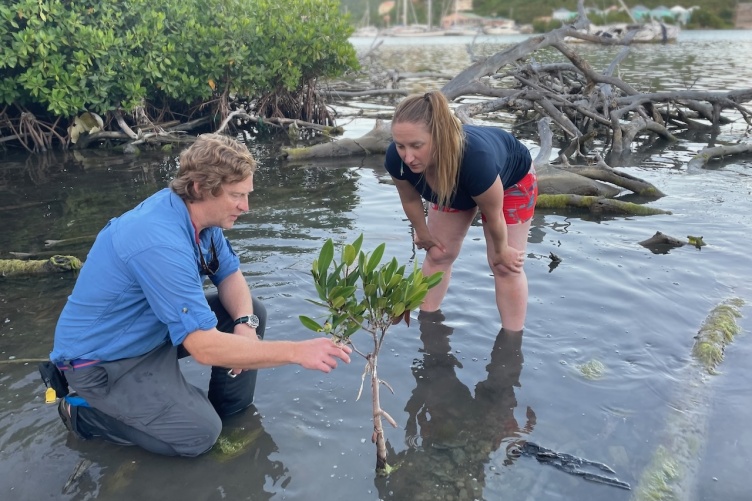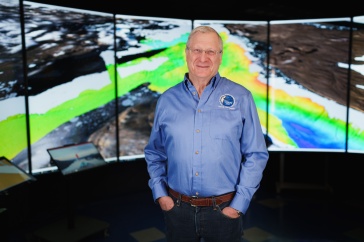
Associate Professor Gregg Moore and Visiting Assistant Professor Michelle Fournet work at a mangrove site in the British Virgin Islands.
Gregg Moore, coastal restoration ecologist and associate professor in the department of biological sciences, has invited Michelle Fournet and Laura Kloepper, both visiting assistant professors in the department of biological sciences, to contribute to the ecological restoration work in the British Virgin Islands that he is leading as part of a partnership with H. Lavity Stout Community College (HLSCC) in Tortola.
Fournet, who is also the associate director for education at the UNH Center for Acoustics Research and Education and an accomplished marine acoustician, is monitoring the soundscape of the waters around mangrove roots in an attempt to detect key sea floor organisms that distinguish between damaged systems, recovering systems and natural healthy systems. The research builds on her work in Everglades National Park in South Florida, which revealed changes to the acoustic community following ecological disturbances.
In December, Moore and Fournet visited several mangrove sites in the BVI and deployed hydrophones that will be recording marine life vocalizing among the tangled roots of the mangrove over the next five to six weeks. Their hope is the recorders will capture data that will add a valuable dimension to the assessment of the mangroves recovery and the associated ecosystem services restored mangroves can provide.
Moore and Fournet are working with Susan Zaluski, head of marine and maritime studies at HLSCC’s Centre for Applied Marine Studies. In 2019, UNH established a partnership with the college to promote research and training exchanges and collaborations between the two institutions to create opportunities for students and faculty. As a part of the partnership, Creightanya Brewley and Nia Jeffers, two HLSCC alumni, joined UNH’s marine biology master’s program in fall 2021.
Jeffers, who managed the HLSCC mangrove nursery, is comparing techniques to increase mangrove restoration planting success for her thesis. Brewley has been conducting research to update the status of an endemic, endangered frog known as the Virgin Islands Coqui (Eleutherodactylus schwartzi).
“Little is known about this tiny, fragile amphibian,” says Moore. “While historic surveys have documented the decline of the population, the most recent published work on the species is over 20 years old.”

Advancing the science on the species, Brewley is studying the characteristics of its habitats that may hold clues for conservation and management plans to protect the frogs from current and future threats. In collaboration with Moore (her advisor), Zalusky and Cassander Titley-O'Neal, director of the BVI’s National Parks Trust, she has been recording the vocalization of several native and non-native frogs that can be easily confused for one another due to similar calls.
Kloepper, a terrestrial acoustician, is providing critical guidance on analysis and interpretation of the recordings, while Fournet is helping to expand this sort of acoustic training in the region. In addition, Kim Babbitt, COLSA’s associate dean of academic affairs and wildlife ecologist, has been sharing her expertise on the community ecology of amphibians and Bonnie Brown, professor and chair of the department of biological sciences, is leading a genomic analysis of frog DNA that seeks to corroborate acoustic data with positive identification of vocally similar taxa.
Some of the most recent recordings, which demonstrate of male courtship vocalization of the Virgin Islands Coqui, can be heard here. Brewley’s first publication from her collaborative work is expected soon.
This work is supported by the Darwin Initiative and the J.A. Woollam Foundation.
-
Written By:
Sarah Schaier | College of Life Sciences and Agriculture
















































